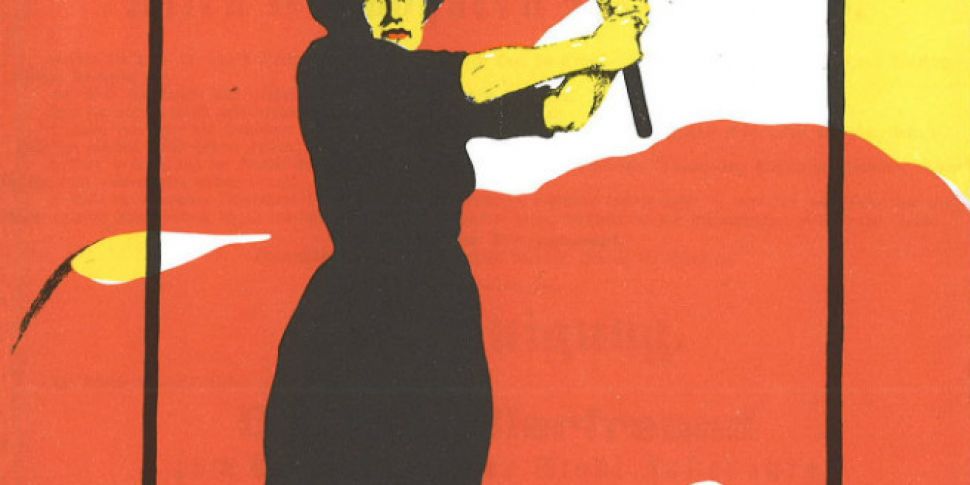On the 8th of March 1917 women across Russia began a strike for political rights and an end to Russia’s involvement in the First World War and the starvation and suffering this was causing. This proved to be one of the major sparks for the February Revolution and soon Russia and the world was upturned as the ancient tsarist regime fell. Women found they had a political voice in this new regime and after the October Revolution International Women’s Day was made an official holiday in Russia.
As communism and the USSR spread so too did this holiday, even reaching far beyond the iron curtain. Yet even after the Soviet Union’s collapse this day remained important in many corners of the world. This Saturday the world will again come together to celebrate International Women’s Day and try to promote women’s rights and cultivate a world in which the sexes are equal. In celebration of March 8th and women the world wide ‘Talking Books’ will talk with poet Paula Meehan about her experiences growing up in working-class Dublin and her work as a poet and writer tomorrow at 7am.
One Woman
Meehan was born the eldest of six children to a working-class family in Dublin in 1955. Like many people at the time her parents had to emigrate to find work. While this saw Meehan begin her education in England she soon returned home to the city that would define so much of her life. Her life back in Dublin was far from sedentary and she attended a number of schools before finishing her primary education at Gardiner Street.
While Meehan is mainly known for her Poems and plays she has also been heavily involved in other theatres of art and with helping those from disadvantaged backgrounds. This activism and community spirit can be seen early in Meehan’s life and she was expelled from her first secondary school for organising a protest march against the institution. After completing the Intermediate Certificate on her own she moved on to a vocational school to earn her Leaving Certificate.
During her studies Meehan became involved in music, dance, and theatre and by the 1970s was writing her own songs lyrics. These lyrics slowly evolved into poems as Meehan graduated from secondary school to Trinity College Dublin. She spent the next five years studying English, History, and Classic Civilisation; taking a year out to travel through Europe. During this time Meehan continued her artistic life and remained active in various styles of performance.
 Paula Meehan
Paula Meehan
After graduating Meehan took to the roads again; visiting, amongst other places, England, Scotland, Germany, and Greece. Then in 1981 she began to study in Eastern Washington University. Two years later Meehan graduated with a Masters in Fine Arts in Poetry and soon returned to Ireland. Over the following years Meehan established herself as one of Ireland’s most prominent female poets. Then in 1995 she added playwriting to her resume, penning successful works for children as well as adults.
Her success as a poet, dramatist, and writer saw Meehan offered and take up various teaching positions both in Ireland and abroad, including the US and Canada. Meehan, however, never limited her teaching to colleges or universities and has been strongly involved in programmes for underprivileged communities, including teaching in prisons. This isn’t that surprising, however, considering Meehan’s own working-class background and the interest of her poems and plays.
The Writing Life, featuring Paula Meehan
Growing up in Dublin during the 1960s and ‘70s gave Meehan a box seat to the slow but inexorable changes that were transforming the country. Being a woman from a working-class background Meehan belonged to one of the cross-sections of society that benefitted most from Ireland’s modernising. Yet she was far from a passive participant in this time of change. Though active in various artistic circles Meehan’s main contribution to Ireland’s drive toward modernity and liberation came from her poetry.
Drawing on her experiences growing up Meehan used her skill with words and verse to highlight the hardships endured by women living in a world dominated by men and the Catholic Church. In her poems Paula Meehan shows us the various incarnations of femininity she experienced herself growing up, from the mother raising children and holding the home together to the pregnant teen ignored by all for her apparent shame. Yet her poetry wasn’t limited to this one subject and Meehan has used words to paint a vivid picture of the Dublin she grew up in and saw change so much around her.
Paula Meehan has been given numerous awards and accolades for her poetry, playwriting, and community work. In September 2013 she was named Ireland Professor of Poetry by President Michael D Higgins. This position will see Meehan work as professor of poetry in Trinity College, Queens University Belfast, and UCD over the following 3 years.
 Susan and Paula in Newstalk studios
Susan and Paula in Newstalk studios
Listen back to ‘Talking Books’ as Susan and Paula look back on the Ireland that was. What was it like growing up in Dublin during the 1950s, ‘60s, and ‘70s? What was the world like for a woman in Ireland at that time? And what exactly does Paula Meehan mean by ‘the brutality of truth’? Join us as we celebrate International Women’s Day a little bit early with one of Ireland’s greatest living poets.









